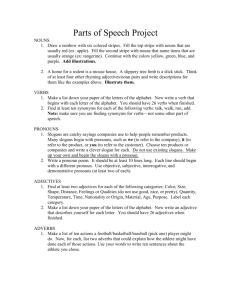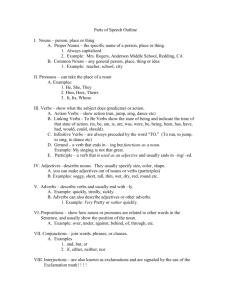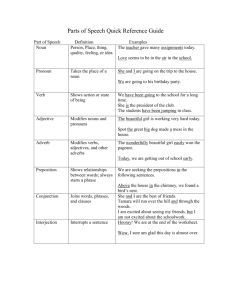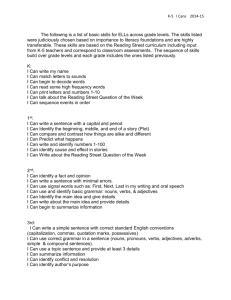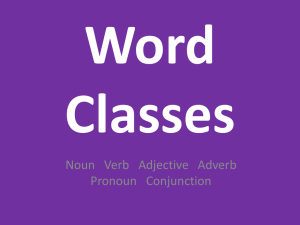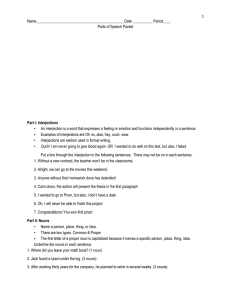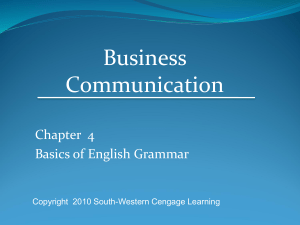SEVENTH GRADE STUDY GUIDE - Springfield Public Schools
advertisement
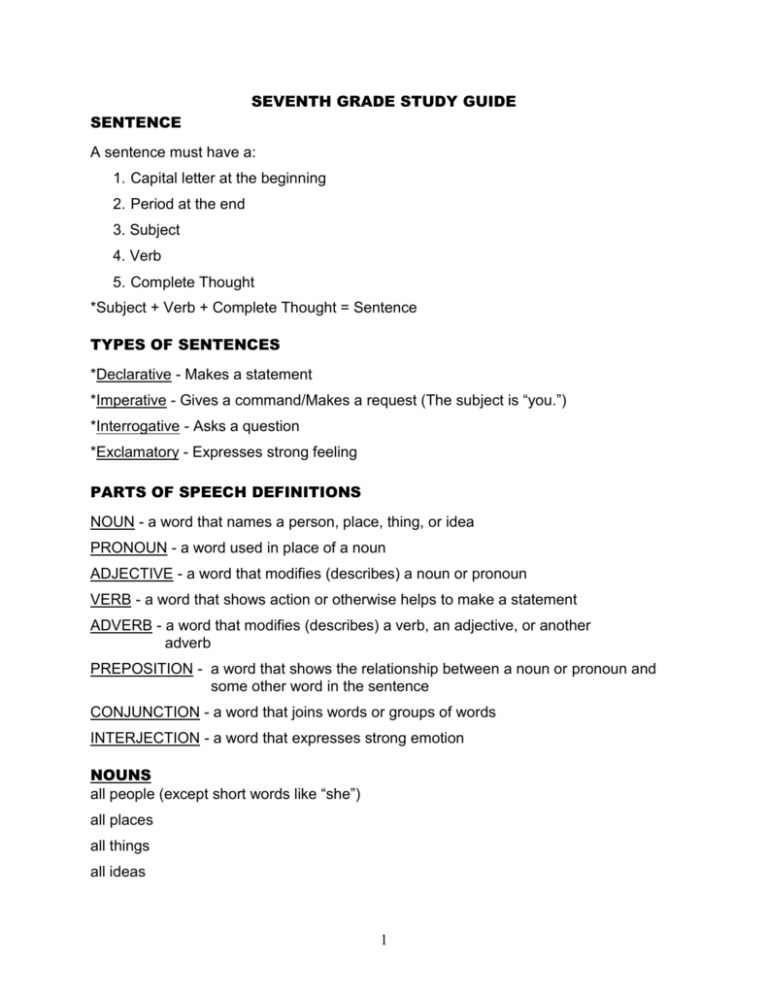
SEVENTH GRADE STUDY GUIDE SENTENCE A sentence must have a: 1. Capital letter at the beginning 2. Period at the end 3. Subject 4. Verb 5. Complete Thought *Subject + Verb + Complete Thought = Sentence TYPES OF SENTENCES *Declarative - Makes a statement *Imperative - Gives a command/Makes a request (The subject is “you.”) *Interrogative - Asks a question *Exclamatory - Expresses strong feeling PARTS OF SPEECH DEFINITIONS NOUN - a word that names a person, place, thing, or idea PRONOUN - a word used in place of a noun ADJECTIVE - a word that modifies (describes) a noun or pronoun VERB - a word that shows action or otherwise helps to make a statement ADVERB - a word that modifies (describes) a verb, an adjective, or another adverb PREPOSITION - a word that shows the relationship between a noun or pronoun and some other word in the sentence CONJUNCTION - a word that joins words or groups of words INTERJECTION - a word that expresses strong emotion NOUNS all people (except short words like “she”) all places all things all ideas 1 *Proper nouns are capitalized. Common nouns are not capitalized. *Follow the words a, an, the Follow possessives (examples - his, her, my, our, their, its, your) Found at the end of prepositional phrases *Compound Nouns - two words that make up one noun - earthquake, high school, son-in-law *Collective Nouns - a word that names a group of something without adding an “s” - crowd, army, class PRONOUNS Replace nouns (usually short words) *Words ending in one, body, and thing (someone, somebody, something) Words ending in self or selves (himself, themselves) Antecedent - the noun the pronoun replaces *Examples of indefinite pronouns (know ten without suffixes for the quiz) another anybody anyone anything several much neither nobody no one none both few many some all each either everybody everyone any everything little nothing one more other(s) somebody someone something most *Examples of personal pronouns (possessive pronouns are underlined – they are sometimes referred to as adjectives) I me my mine you your yours it its he him his she her hers their theirs they them we which whose us our ours *Examples of interrogative pronouns who whom what *Examples of demonstrative pronouns this that these those ADJECTIVES Describe nouns and pronouns *Answer the questions Which, How many, How much, What kind of Usually found - Before nouns - After little verbs - Middle of prepositional phrases (between the preposition and the noun or pronoun) *A, an, and the are called the Articles (they are adjectives) 2 *Proper Adjectives – Adjectives that are capitalized. Example: Italian food VERBS Show action (action verbs) *END IN “ED” Test - Fill in the blank with a verb: Let’s _________________. Show a “state of being” (linking verbs) Help the main verb (helping verbs) *Helping verbs (Big 5 - 4 groups of 3 - 3 groups of 2) am is are was were be being been has have had do does did may might must can could shall should will would “Not” is not a verb Ask “Who (or what) did what” -- what they did is a verb ADVERBS Describe verbs, adjectives, and other adverbs Answer when? where? how? how often? to what extent? Steps to finding adverbs: 1. Ask who or what the sentence is about (subject). 2. Ask what did the subject do (verb). If the subject didn’t do anything, look for memorized verbs. 3. Ask when did the subject do the action (adverb). 4. Ask where did the subject do the action (adverb). 5. Ask how did the subject do the action (adverb). 6. Look for any other –ly words. 7. Find adjectives – ask how. 8. Look at the adverbs – ask how. Adverbs will interrupt verb phrases will not go has never won will always lose had never seen Often end in -ly easily, happily, excitedly, lazily, probably, uncontrollably Most common adverbs (need to memorize) too, very, quite, rather, not, never, almost, so, really, always, often, a lot 3 PREPOSITIONS Much like adverbs - can say when or where in more than one word A prepositional phrase begins with a preposition and ends with a noun or pronoun Sentences still make sense when the prepositional phrase is taken out *Need to memorize list of prepositions: aboard about above across according to after against along amid among around at as because of before behind below beneath beside between beyond by by means of like during except for from in in addition to in front of in spite of instead of inside into throughout near of off on on account of out out of over past since through to toward under underneath unlike until up upon with within without CONJUNCTIONS Join words, groups of words, or sentences Each side of the conjunction must be equal ex. he ran and they walked ex. easily and swiftly ex. in the park and around the tree *Types of conjunctions Coordinating and, or, nor, for, so, yet, but Correlative (co-related) - always act in pairs either...or, neither...nor, both...and, not only...but also, whether...or Subordinate - separate a sentence and a clause in a sentence after, although, because, before, if, since, though, unless, until, when, whenever, while ex. Although they lost the game, they still were happy. INTERJECTIONS Show emotion or feeling Usually punctuated with an exclamation point, but can also use a comma Wow, shh, yippie, hooray, no, swear words 4


